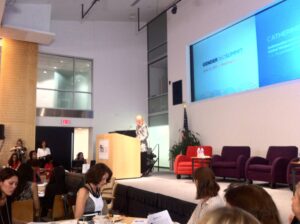Key takeaways from the Gender360 Summit: Progress and shortcomings in achieving gender equality

By Elizabeth Romanoff Silva on June 22, 2015
Thursday, June 11th marked the second annual Gender360 Summit hosted by FHI360. More than 250
gender and development professionals attended the summit, which boasted an impressive list of speakers and panelists, including USAID Senior Coordinator for Gender Equality & Women’s Empowerment Susan Markham; Catherine Russell, Ambassador-at-Large for Global Women’s Issues at the Department of State; and Andrea Bertone, Director of the Gender Department at FHI360. Panel discussions included the right approaches to achieving gender equality, the role of donors in advancing a gender equality agenda, and featured short talks about engaging boys and men in the discussion and targeting hard to reach populations.
The Gender360 Summit also featured an interactive Gender Lounge, where participants discussed issues including organizational gender mainstreaming, measuring gender equality, and conducting effective gender analyses, using probing questions and mind mapping techniques. I participated in the Gender Lounge discussion about conducting an effective gender analysis. Together with other gender specialists from ACDI/VOCA, Counterpart International and Plan International, among other organizations, we shared best practices and lessons learned from conducting gender analyses and discussed definitions and requirements. I highlighted the importance of incorporating other gender-related assessments and analyses, such as USAID Country Gender Assessments which are available for many countries, and the USAID Country Development Cooperation Strategies as background resources to review and take into account when conducting a gender analysis. As I am preparing to support our USAID ASSIST team in Mali conduct a gender analysis this coming week, the discussion was very timely.
From my point of view, there were three important takeaways from the gender summit. The first is a recognition of how far the gender and development community has progressed in advancing gender equality in our work globally and leadership from the US Government and US-based NGOs has especially contributed to this in recent years. Second is the grounding reality that there remains a lot to do. Many inequalities persist and while gender-responsive programming is on the rise, funding and institutional buy-in for comprehensive gender integration and mainstreaming, coupled with sustainability issues thwart progress in following through on gender mandates and achieving gender equality.
My final takeaway is the immense value that this conference offered: it provided a platform to bring practitioners together to meet, discuss topics that are important to our work, to learn from one another and to begin the discussion of how to map our way forward. Through the USAID ASSIST Project, our approach to improving health outcomes includes many techniques that involve bringing people together to promote knowledge sharing and to synthesize learning, including about gender. As a gender and knowledge management specialist, I recognize the significance of the Gender360 Summit and look forward to more opportunities to collaborate with the gender and development community around these important topics.